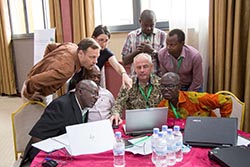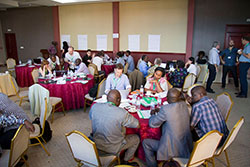N2Africa is approaching the end of Phase II for the core countries while the Tier 1 countries phased out at the end of 2017. The N2Africa Annual Planning Meeting held in the Grand Legacy Hotel in Kigali (15-18 May) focused on exploring opportunities for Core and Tier 1 countries to continue their catalytic roles in providing technical backup to other projects and to stimulate diffusion of N2Africa technologies. Discussions were centred around the question “how can N2Africa reach 80% of the farmers who would benefit from N2Africa technologies?”.
Participants of the meeting were members of the N2Africa Advisory Committee (NAC), Country Coordinators, project staff, Business Development Officers of the Core Countries, a delegation from the Rwanda Agriculture Board (RAB), and representatives of EMBRAPA, One Acre Fund, Farm Radio International, CARITAS and COCOF.
Before tackling that challenge of continuing to reach new farmers, key achievements and learnings in terms of agronomy, rhizobiology, partnerships and M&E were presented by country coordinators and staff of the Core and Tier 1 countries. An overview of these accomplishments and an account of reached targets can be found in the Annual Report of 2017 and was summarized in Podcaster 51. Some of the most distinct developments during Phase II include a large focus on building strong partnerships, the take-off of inoculant production, distribution and use (especially Nodumax in West Africa), and reaching numbers of farmers well beyond the set targets through a wide variety of means.
 |
 |
| Lively discussions during the Annual Planning Meeting in Kigali |
The presentations and following plenary discussions helped to identify key strategic partners (new and existing) who could take on multiple roles of N2Africa and to develop locally-tailored approaches along the best-bet to best-fit continuum. Maps showing legume distribution and population densities were used to identify areas where there could be potential markets for N2Africa technologies and the Bass-model for diffusion was introduced for modelling diffusion of these technologies. Feedback was given to the prototype of an online tool which could serve as a means of making N2Africa’s findings transparent and accessible.
The third full day of the meeting was a field trip to the Gahunga and Muko action sites in Northern Rwanda, where we visited the impressive climbing bean fields of farmer cooperatives. A more detailed report of the field trip can be found in a separate section in this Podcaster. The visit was followed by a seminar at La Palme hotel in Musanze. The seminar included presentations from two rhizobiologists who did their MSc research with N2Africa, and a presentation on the history of climbing beans in Rwanda.
On the last day, special attention was given to finalizing plans for the impact assessment study, to planning how to make best use of the remaining 2018 budget and to determining topics for R&D that have not been addressed yet and could be readily proposed when an opportunity for funding arises in the future.
Closing the meeting, there was a strong sense of accomplishment as a team and a clear intention to keep in touch after phasing out. N2Africa will soon take on a different role than it had in the last ten years and when we maintain this network we can be sure of more fruitful collaborations in the future!
Eva Thuijsman, Wageningen University & Research
